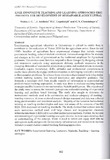Innovative teaching and learning approaches that promote the development of sustainable agricultural

View/
Date
2011-09Author
Cheminingw'a, G.N.
Lopokoiyit, M.C.
Ambuko, J.
Maina, J. G. I.
Language
enMetadata
Show full item recordAbstract
Transforming agricultural education in Universities is critical to enable them to
contribute to the realization of Vision 2030 for the agriculture sector. Since the mid
1980's faculties of agriculture have experienced changes that include reduced
government funding, reduced student enrolment, increased competition for students,
and changes in the role of government as the traditional employer for Agricultural
graduates. Universities must therefore respond to these changes by designing relevant
and responsive curricula using appropriate delivery methods responsive to the
changing demands of sustainable production systems and market driven economies.
Graduates require knowledge, skills, attitudes and professional competencies to
enable them effectively engage rural cornrnunities in developing innovative solutions
to their complex problems. To achieve these objectives there is need to develop student
centred learning systems that reward innovative and adaptable graduates. This
demands a paradigm shift from dyadic transfer of information to experiential and
problem-based learning approaches. A study was done to evaluate teaching-learning
strategies used by lecturers in two universities, Nairobi and Egerton. The objectives of
the study were to assess the lecturer's perceptions and understanding of experiential
learning and problem based learning. The study also sought to determine the
instructional methods used in he universities and evaluate adequacy of teaching -
learning resources. A cross sectional research design was used and data was collected
using questionnaires and document analysis. Majority of the lecturers had no formal
training on teaching methodologies and were not aware of the contents of the ISO
9001 :2008 document on teaching standards. The study showed that lectures were the
main instruction method used, and large classes and inappropriate classroom
infrastructure made it difficult to use other instructional methods. Further, the lecturers
understanding of experiential learning was quite diverse, in most cases showing a lack
of understanding of the concept. There is need to retool and equip staff with the
appropriate skills and provide the necessary infrastructure and resources to facilitate
lecturers to adapt student centred teaching-learning approaches.
Citation
Optimimization of Agricultural Value Chains for sustainable DevelopmentSponsorhip
National Council of Science and Technology, The Kenya Seed CompanyPublisher
Faculty of Agriculture, University of Nairobi
Description
aGRO 2011 Biennial Conference presentation
